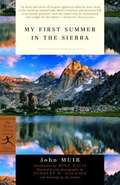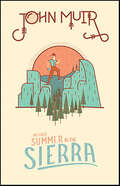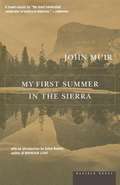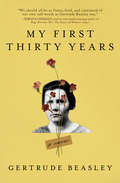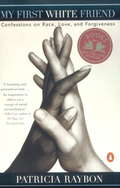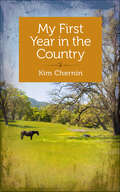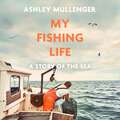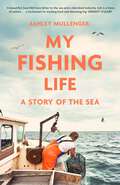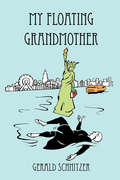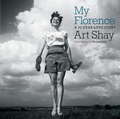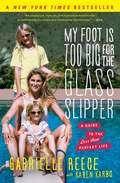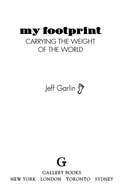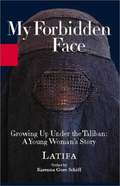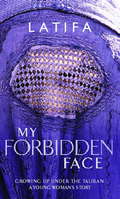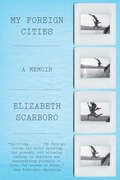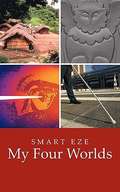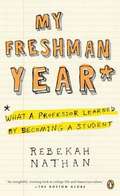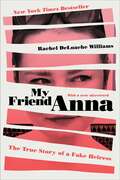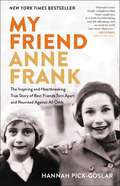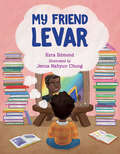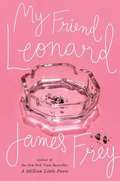- Table View
- List View
My First Summer in the Sierra
by John Muir Mike Davis Herbert W. GleasonJohn Muir, a young Scottish immigrant, had not yet become a famed conservationist when he first trekked into the foothills of the Sierra Nevada, not long after the Civil War. He was so captivated by what he saw that he decided to devote his life to the glorification and preservation of this magnificent wilderness. My First Summer in the Sierra, whose heart is the diary Muir kept while tending sheep in Yosemite country, enticed thousands of Americans to visit this magical place, and resounds with Muir's regard for the "divine, enduring, unwasteable wealth" of the natural world. A classic of environmental literature, My First Summer in the Sierra continues to inspire readers to seek out such places for themselves and make them their own.From the Trade Paperback edition.
My First Summer in the Sierra
by John MuirConsidered one of the patron saints of twentieth-century environmental activity, John Muir's appeal to modern readers is that he not only explored the American West but also fought for its preservation. My First Summer in the Sierra is Muir’s account of his adventures and observations while working as a shepherd in the Yosemite Valley, which later became Yosemite National Park as a direct result of Muir’s writings and activism. Muir’s heartfelt and often humorous descriptions of his first summer spent in the Sierra will captivate and inspire long-time fans and novice naturalists alike.
My First Summer in the Sierras
by John MuirMuir kept this journal on his first extended trip to Yosemite in 1869. Here he faithfully recorded his impressions of the dazzling animal and plant life he encountered in the magnificent Sierra.
My First Thirty Years: A Memoir
by Gertrude Beasley"Thirty years ago, I lay in the womb of a woman, conceived in a sexual act of rape, being carried during the prenatal period by an unwilling and rebellious mother, finally bursting from the womb only to be tormented in a family whose members I despised or pitied, and brought into association with people whom I should never have chosen."Shortly after its 1925 publication, Gertrude Beasley's ferociously eloquent feminist memoir was banned and she herself disappeared under mysterious circumstances. Though British Nobel Prize winner Bertrand Russell called My First Thirty Years "truthful, which is illegal" and Larry McMurtry pronounced it the finest Texas book of its era, Beasley's words have been all but inaccessible for almost a century—until now.Beasley penned one of the most brutally honest coming-of-age historical memoirs ever written, one which strips away romantic notions about frontier women's lives at the turn of the 20th century. Her mother and sisters braved male objectification and the indignities of poverty, with little if any control over their futures. With characteristic ferocity, Beasley rejected a life of dependence, persisting in her studies and becoming first a teacher, then a principal, then a college instructor, and finally a foreign correspondent.Along the way, Beasley becomes a strident activist for women's rights, socialism, and sex education, which she sees as key to restoring bodily autonomy to women like those she grew up with. She is undaunted by authority figures but secretly ashamed of her origins and yearns to be loved. My First Thirty Years is profoundly human and shockingly candid, a rallying cry that cost its author her career and her freedom.Her story deserves to be heard.Praise for My First Thirty Years:"For almost a century in Texas literary circles, Gertrude Beasley's 1925 memoir has been more a legend than a book... The tangled history of My First Thirty Years, and Beasley's horrific personal fate, are case studies in society's merciless treatment of women of her era who gave voice to socially unspeakable truths. The memoir's republication this month, which makes it widely available for the first time in 96 years, is a long-overdue moment of reckoning. It's also a rich gift to the Texas literary canon."—Texas Monthly"We should all be as fierce, loud, and convinced of our own self-worth as Gertrude Beasley was. This story of a justifiably angry woman living ahead of the world she lived in will resonate deeply today."—Soraya Chemaly, activist and award-winning author of Rage Becomes Her: The Power of Women's Anger"Gertrude Beasley's 1925 memoir grabs the reader by the arm and holds tight, speaking with a voice as compelling as if she had just put down her pen this morning. Feminist, socialist, and acute observer of both herself and the world around her, Beasley gives us stories that illuminate the costs of poverty and of being a woman. To read My First Thirty Years is to be in conversation with an extraordinary mind."—Anne Gardiner Perkins, author of Yale Needs Women
My First White Friend
by Patricia Raybon"In mid-life Afro-American journalist Raybon made a conscious decision to stop hating white people. Her journal/analysis provides discourse on hatred and forgiveness, the rise of her hatred, and her efforts to conquer her fears and forgive the past. An unusual account of conscious change. "-Kirkus Reviews. .
My First Year in the Country
by Kim CherninAn urban woman moves to the country and falls in love with a horse—an embodiment of nature, wisdom, and living in the moment. She is not exactly a spring chicken, as the village people are quick to point out, and she hasn’t been in the saddle since she was a child. Her tireless quest for the world’s most beautiful horse makes her look like a fool. That’s OK with her; she knows it isn’t far from the truth. But will it stop her?
My Fishing Life: A Story of the Sea
by Ashley Mullenger'A beautiful, heartfelt love letter to the sea, and a cherished industry. Ash is a force of nature, she's a testament to working hard and dreaming big' Dermot O'LearyAshley Mullenger had never planned to become a fisherman. A chance fishing trip - catching mackerel off the Norfolk coast - was the start of an obsession. One that resulted in a transformation from clean-cut office worker to commercial 'Fisherman of the Year', and proud working owner of two boats, Fairlass and Saoirse, alongside skipper Nigel.This is a memoir of that journey, a life swept up in tides and elements, strength of mind and body, of old ways and new struggles. It's about the bravery of crews, early mornings, weather-beaten characters and those that can sink pints as fast as they can haul pots. These coastal communities and age-old livelihoods are built on trust, courage and skill - but they are also fraying against politics, poverty and climate change. The reality of commercial fishing is rarely seen, but Ashley carries us across the waves and around the UK's waters in vivid detail to show what is really happening at sea to land the fish on our plates.My Fishing Life is both a rallying cry and a love letter, rinsed down with salty humour, to an industry often misunderstood. One woman's unique story of boat, skipper, sea and catch ultimately becomes a transformative view of a world that impacts deeply on us all.
My Fishing Life: A Story of the Sea
by Ashley Mullenger'A beautiful, heartfelt love letter to the sea, and a cherished industry. Ash is a force of nature, she's a testament to working hard and dreaming big' Dermot O'LearyAshley Mullenger had never planned to become a fisherman. A chance fishing trip - catching mackerel off the Norfolk coast - was the start of an obsession. One that resulted in a transformation from clean-cut office worker to commercial 'Fisherman of the Year', and proud working owner of two boats, Fairlass and Saoirse, alongside skipper Nigel.This is a memoir of that journey, a life swept up in tides and elements, strength of mind and body, of old ways and new struggles. It's about the bravery of crews, early mornings, weather-beaten characters and those that can sink pints as fast as they can haul pots. These coastal communities and age-old livelihoods are built on trust, courage and skill - but they are also fraying against politics, poverty and climate change. The reality of commercial fishing is rarely seen, but Ashley carries us across the waves and around the UK's waters in vivid detail to show what is really happening at sea to land the fish on our plates.My Fishing Life is both a rallying cry and a love letter, rinsed down with salty humour, to an industry often misunderstood. One woman's unique story of boat, skipper, sea and catch ultimately becomes a transformative view of a world that impacts deeply on us all.
My Fishing Life: A Story of the Sea
by Ashley Mullenger'A beautiful, heartfelt love letter to the sea, and a cherished industry. Ash is a force of nature, she's a testament to working hard and dreaming big' Dermot O'LearyAshley Mullenger had never planned to become a fisherman. A chance fishing trip - catching mackerel off the Norfolk coast - was the start of an obsession. One that resulted in a transformation from clean-cut office worker to commercial 'Fisherman of the Year', and proud working owner of two boats, Fairlass and Saoirse, alongside skipper Nigel.This is a memoir of that journey, a life swept up in tides and elements, strength of mind and body, of old ways and new struggles. It's about the bravery of crews, early mornings, weather-beaten characters and those that can sink pints as fast as they can haul pots. These coastal communities and age-old livelihoods are built on trust, courage and skill - but they are also fraying against politics, poverty and climate change. The reality of commercial fishing is rarely seen, but Ashley carries us across the waves and around the UK's waters in vivid detail to show what is really happening at sea to land the fish on our plates.My Fishing Life is both a rallying cry and a love letter, rinsed down with salty humour, to an industry often misunderstood. One woman's unique story of boat, skipper, sea and catch ultimately becomes a transformative view of a world that impacts deeply on us all.
My Floating Grandmother
by Gerald SchnitzerPanic was a permanent guest in the Schnitzer's home during the 1920s. They celebrated life, but never in moderation. Thanks to Gerald's grandmother acting as a traffic cop on an emotional oasis, order was restored. Before her death, Grandma Sarah discovered the calming waters off Coney Island. She never learned to swim, not a stroke, but she could float, sometimes out of sight of land - but that's another story.
My Florence
by Art ShayMy Florence is a collection of striking moments drawn from the shared life of renowned Chicago photojournalist ART SHAY and his beloved wife, Florence. By turns casual and glamorous, pensive and humorous, the photographs start the day Art and Florence met in 1942, as 20-year-old camp counselors in the Catskill Mountains, and continue for seven decades.Former LIFE, Fortune, Time, and Sports Illustrator photographer, ART SHAY is famous for immortalizing some of America's most compelling 20th century figures, including John F. Kennedy Jr., Muhammad Ali, and Eleanor Roosevelt. But the story of Florence was Shay's constant beat. The result is a story that runs deep and reads as a call to joy and source of inspiration for lovers, family, friends, and the photographer in us all.From the Trade Paperback edition.
My Foot Is Too Big for the Glass Slipper
by Gabrielle Reece Karen KarboSo you got the guy on the big white horse, and the beautiful little mermaids, and the picket fence, and your life isn' t . . . perfect in every imaginable way? You're not alone. In 1997, Gabrielle Reece married the man of her dreams--professional surfer Laird Hamilton--in a flawless Hawaiian ceremony. Naturally, the couple filed for divorce four years later. In the end they worked it out, but not without the ups and downs, minor hiccups, and major setbacks that beset every modern family. With hilarious stories, wise insights, and concrete takeaways on topics ranging from navigating relationship issues to aging gracefully to getting smart about food, My Foot Is Too Big for the Glass Slipper is the brutally honest, wickedly funny, and deeply helpful portrait of the humor, grace, and humility it takes to survive the happily ever after.ns the notion that women can "have it all" on its head. As Gabby dismantles the notion of happily ever after, she gives readers plenty of concrete takeaways about how to deal. She underscores the notion that you have to make yourself happy before you can make anyone else happy. My Foot Is Too Big for the Glass Slipper is an irresistible, hilarious, and helpful portrait of the humor, grace, and humility it really takes to stay sane given the challenges of being a modern wife and mother.
My Footprint
by Jeff GarlinJeff Garlin shares his hysterical and eye-opening journey to reduce his waistline and his carbon footprint during the production of the seventh season of HBO's Curb Your EnthusiasmJeff Garlin has dedicated the filming of an entire season of Curb Your Enthusiasm to completely making over his lifestyle in two major ways--by lightening his physical and his ecological footprints. After many false starts, he believes that writing a book about the experiment is the only possible way to help him lose weight and go green. The hardest part of the endeavor is overcoming his food addiction--especially when craft service has a constant buffet of everything delicious you could imagine on set. In addition to cutting calories, Jeff accidentally falls into a love affair with pilates, sweats with Richard Simmons, and twice visits the Pritikin Longevity Center, which he says is "rehab for people who eat too much pizza." Larry David's rooting for him. Jerry Seinfeld's plotting against him. And his wife is just plain annoyed by everything. As far as going green, Jeff has always been a big recycler, but he has a lot to learn. For example, actor Ed Begley Jr. is the guy to call if you want to reduce your environmental impact. Jeff does, and it changes everything. He hopes that being healthy and green becomes a big part of who he is--if not now, when?
My Forbidden Face: A Young Woman's Story
by Linda Coverdale Queen LatifahLatifa describes the consequence of the ruthless rule of the Taliban on the dreams and aspirations of young women in Afghanistan.
My Forbidden Face: Growing Up Under The Taliban - A Young Woman's Story
by LatifaLatifa was born into an educated middle-class Afghan family in Kabul in 1980. She dreamed of one day of becoming a journalist, she was interested in fashion, movies and friends. Her father was in the import/export business and her mother was a doctor. Then in September 1996, Taliban soldiers seized power in Kabul. From that moment, Latifa, just 16 years old became a prisoner in her own home. Her school was closed. Her mother was banned from working. The simplest and most basic freedoms - walking down the street, looking out a window - were no longer hers. She was now forced to wear a chadri. My Forbidden Face provides a poignant and highly personal account of life under the Taliban regime. With painful honesty and clarity Latifa describes the way she watched her world falling apart, in the name of a fanatical interpretation of a faith that she could not comprehend. Her voice captures a lost innocence, but also echoes her determination to live in freedom and hope. Earlier this year, Latifa and her parents escaped Afghanistan with the help of a French-based Afghan resistance group.
My Forbidden Face: Growing Up Under The Taliban - A Young Woman's Story
by LatifaLatifa was born into an educated middle-class Afghan family in Kabul in 1980. She dreamed of one day of becoming a journalist, she was interested in fashion, movies and friends. Her father was in the import/export business and her mother was a doctor.Then in September 1996, Taliban soldiers seized power in Kabul. From that moment, Latifa, just 16 years old became a prisoner in her own home. Her school was closed. Her mother was banned from working. The simplest and most basic freedoms - walking down the street, looking out a window - were no longer hers. She was now forced to wear a chadri. My Forbidden Face provides a poignant and highly personal account of life under the Taliban regime. With painful honesty and clarity Latifa describes the way she watched her world falling apart, in the name of a fanatical interpretation of a faith that she could not comprehend. Her voice captures a lost innocence, but also echoes her determination to live in freedom and hope. Earlier this year, Latifa and her parents escaped Afghanistan with the help of a French-based Afghan resistance group.
My Foreign Cities: A Memoir
by Elizabeth Scarboro"Uplifting . . . it's about savoring the present, not allowing sadness to dominate and surrendering yourself to love, for better or worse."--San Francisco Chronicle When she was just seventeen, independent and ambitious Elizabeth Scarboro fell in love with irreverent and irresistible Stephen. She knew he had cystic fibrosis, that he was expected to live only until the age of thirty or so, and that soon she'd have a choice to make. She could set out to travel, date, and lead the adventurous life she'd imagined, or she could be with Stephen, who came with an urgency of his own. In choosing him, Scarboro embraced another kind of adventure--simultaneously joyous and heartrending--staying with Stephen and building a life in the ten years they'd have together. The illness would be present in the background of their lives and then ever-more-insistently in the foreground. Beyond the illness, though, is a breathtaking love story. In crystalline prose, Scarboro describes the pulse of her relationship with Stephen with all its illuminating quirks. Like any young couple, they agonize about career choices, attempt ill-fated road trips, bargain about whether to adopt a puppy, and host one memorably disastrous Thanksgiving. They navigate the growing pains of their twenties alongside the twists and turns of life-threatening disease; if their telephone rings at midnight, the caller might be a heartbroken friend, or the hospital offering a new set of lungs. As time goes on and trouble looms, the dangers of Stephen's illness consume her, just as they will consume readers who feel they have come to know this extraordinary couple. Scarboro tells her story of fierce love and its limitations with humor, grace, and remarkable bravery. My Foreign Cities is a portrait of a young couple approaching mortality with reckless abandon, gleefully outrunning it for as long as they can.
My Four Worlds
by Smart Eze"My Four Worlds" is the autobiography of a blinded war veteran. Smart Eze, was born in Nigeria, began his education, but was unable to attend college due to financial reasons. Then the Biafran-Nigerian civil war erupted, and he became a Biafran soldier. He was blinded in a bomb explosion at age 23. He was taken to Austria for medical treatment, but remained totally blind. However, he received training in braille, cane use, and other skills. He eventually attended university and earned a Ph.D. He has worked for the United Nations and traveled around the globe. In 2012, he was in the USA training and receiving a guide dog for the blind from Guide Dogs of the Desert in California.
My Freshman Year
by Rebekah NathanAfter fifteen years of teaching anthropology at a large university, Rebekah Nathan had become baffled by her own students. Their strange behavior--eating meals at their desks, not completing reading assignments, remaining silent through class discussions--made her feel as if she were dealing with a completely foreign culture. So Nathan decided to do what anthropologists do when confused by a different culture: Go live with them. She enrolled as a freshman, moved into the dorm, ate in the dining hall, and took a full load of courses. And she came to understand that being a student is a pretty difficult job, too. Her discoveries about contemporary undergraduate culture are surprising and her observations are invaluable, making My Freshman Year essential reading for students, parents, faculty, and anyone interested in educational policy.
My Freshman Year: What a Professor Learned By Becoming a Student
by Rebekah NathanAfter more than fifteen years of teaching, Rebekah Nathan, a professor of anthropology at a large state university, realized that she no longer understood the behavior and attitudes of her students. Fewer and fewer participated in class discussion, tackled the assigned reading, or came to discuss problems during office hours. And she realized from conversations with her colleagues that they, too, were perplexed: Why were students today so different and so hard to teach? Were they, in fact, more likely to cheat, ruder, and less motivated? Did they care at all about their education, besides their grades? Nathan decided to put her wealth of experience in overseas ethnographic fieldwork to use closer to home and apply to her own university. Accepted on the strength of her high school transcript, she took a sabbatical and enrolled as a freshman for the academic year. She immersed herself in student life, moving into the dorms and taking on a full course load. She ate in the student cafeteria, joined student clubs, and played regular pick-up games of volleyball and tag football (sports at which the athletic fifty-something-year-old could hold her own). Nathan had resolved that, if asked, she would not lie about her identity; she found that her classmates, if they were curious about why she was attending college at her age, never questioned her about her personal life. Based on her interviews and conversations with fellow classmates, her interactions with professors and with other university employees and offices, and her careful day-to-day observations, My Freshman Year provides a compelling account of college life that should be read by students, parents, professors, university administrators, and anyone else concerned about the state of higher education in America today. Placing her own experiences and those of her classmates into a broader context drawn from national surveys of college life, Nathan finds that today's students face new challenges to which academic institutions have not adapted. At the end of her freshman year, she has an affection and respect for students as a whole that she had previously reserved only for certain individuals. Being a student, she discovers, is hard work. But she also identifies fundamental misperceptions, misunderstandings, and mistakes on both sides of the educational divide that negatively affect the college experience. By focusing on the actual experiences of students, My Freshman Year offers a refreshing alternative to the frequently divisive debates surrounding the political, economic, and cultural significance of higher education--as well as a novel perspective from which to look at the achievements and difficulties confronting America's colleges and universities in the twenty-first century.
My Friend Anna: The True Story of a Fake Heiress
by Rachel DeLoache WilliamsSex and the City meets Catch Me if You Can in the astonishing true story of Anna Delvey, a young con artist posing as a German heiress in New York City—as told by the former Vanity Fair photo editor who got seduced by her friendship and then scammed out of more than $62,000. <P><P>Vanity Fair photo editor Rachel DeLoache Williams’s new friend Anna Delvey, a self-proclaimed German heiress, was worldly and ambitious. She was also generous—picking up the tab for lavish dinners at Le Coucou, infrared sauna sessions at HigherDOSE, drinks at the 11 Howard Library bar, and regular workout sessions with a celebrity personal trainer. <P><P>When Anna proposed an all-expenses-paid trip to Marrakech at the five-star La Mamounia hotel, Rachel jumped at the chance. But when Anna’s credit cards mysteriously stopped working, the dream vacation quickly took a dark turn. Anna asked Rachel to begin fronting costs—first for flights, then meals and shopping, and, finally, for their $7,500-per-night private villa. <P><P>Before Rachel knew it, more than $62,000 had been charged to her credit cards. Anna swore she would reimburse Rachel the moment they returned to New York. <P><P>Back in Manhattan, the repayment never materialized, and a shocking pattern of deception emerged. Rachel learned that Anna had left a trail of deceit—and unpaid bills—wherever she’d been. <P><P>Mortified, Rachel contacted the district attorney, and in a stunning turn of events, found herself helping to bring down one of the city’s most notorious con artists. <P><P>With breathless pacing and in-depth reporting from the person who experienced it firsthand, My Friend Anna is an unforgettable true story of money, power, greed, and female friendship.
My Friend Anne Frank: The Inspiring and Heartbreaking True Story of Best Friends Torn Apart and Reunited Against All Odds
by Hannah Pick-Goslar"Both heartbreaking and life-affirming" (Edith Eger, author of The Choice), the long-awaited New York Times bestselling memoir of Holocaust survivor Hannah Pick-Goslar, who shares an intimate look into her life and friendship with Anne Frank. In 1933, Hannah Pick-Goslar and her family fled Nazi Germany to live in Amsterdam, where she struck up a close friendship with her next-door neighbor, an outspoken and fun-loving young girl named Anne Frank. For several years, the inseparable pair enjoyed a carefree childhood of games, sleepovers, and treats with the other children in their neighborhood of Rivierenbuurt. But in 1942, Hannah and Anne's lives abruptly changed forever. As the Nazi occupation of Amsterdam progressed, Anne and the Frank family seemingly vanished, leaving behind unmade beds and dishes in the sink—but no trace of Anne's precious diary. Torn from her dear friend without warning, Hannah spent the next two years tormented by questions about Anne's fate, wondering if she had, by some miracle, managed to escape danger. In this long‑awaited memoir, Hannah shares the story of her childhood during the Holocaust, from the introduction of anti-Jewish laws in Amsterdam to the gradual disappearance of classmates and, eventually, the Frank family, to Hannah and her family's imprisonment in the Bergen-Belsen concentration camp. As Hannah chronicles the experiences of her own life during and after the war, she provides a searing look at what countless children endured at the hands of the Nazi regime, as well as an intimate, never‑before‑seen portrait of the most recognizable victim of the Holocaust. Culminating in an astonishing fateful reunion, My Friend Anne Frank is the profoundly moving story of childhood and friendship during one of the darkest periods in the world's history.
My Friend Annie (Janet Sandison Novels, #4)
by Jane DuncanPretty Annie Black was Jean's idea of an ideal child: why couldn't awkward young Janet be like her? Which all went to show the gulf of misunderstanding which yawned so ominously between Janet and Jean, once housekeeper to Janet's father and later, alas, her stepmother. Childhood with Jean, and her malevolent presence in the background of Janet's later life form the main theme of the fourth of Jane Duncan's novels about her Friends. To go from highland Reachfar to lowland Cairnton was almost like entering a foreign land for Janet. Many unhappy years were lightened only by holidays at Reachfar, when the commonsense and humour of Tom and George and the true values of the whole family there helped her to rise above the alien atmosphere of Cairnton. Among the quite incomprehensible inhabitants of her new hometown was Annie. Janet was still at school when she realised what pretty Annie's profession was, and their paths were afterwards to cross in various parts of the world on some significant occasions.
My Friend LeVar
by Ezra EdmondCelebrate the joy of reading and imagination with Ezra; he loves discovering new picture books with his friend LeVar Burton, whom he knows from TV!Ezra's friend LeVar always has a book to share. From playing in the snow, to decorating eggs, to eating pancakes with Paul Bunyan--Ezra and LeVar explore all different kinds of stories. Through imaginative play they discover new worlds, learn to be curious, and revel in reading. One day young Ezra meets LeVar Burton in real life! Soon afterward, Ezra discovers that his friends know LeVar from TV, too. This joyous celebration of the impact that LeVar Burton had on kids during his years on television stems from the author's real-life admiration of LeVar Burton and their chance meeting when Ezra was a child.
My Friend Leonard
by James FreyPerhaps the most unconventional and literally breathtaking father-son story you'll ever read, My Friend Leonard pulls you immediately and deeply into a relationship as unusual as it is inspiring.<P><P> The father figure is Leonard, the high-living, recovering coke addict "West Coast Director of a large Italian-American finance firm" (read: mobster) who helped to keep James Frey clean in A Million Little Pieces. The son is, of course, James, damaged perhaps beyond repair by years of crack and alcohol addiction-and by more than a few cruel tricks of fate.<P> James embarks on his post-rehab existence in Chicago emotionally devastated, broke, and afraid to get close to other people. But then Leonard comes back into his life, and everything changes. Leonard offers his "son" lucrative—if illegal and slightly dangerous—employment. He teaches James to enjoy life, sober, for the first time. He instructs him in the art of "living boldly," pushes him to pursue his passion for writing, and provides a watchful and supportive veil of protection under which James can get his life together. Both Leonard's and James's careers flourish…but then Leonard vanishes. When the reasons behind his mysterious absence are revealed, the book opens up in unexpected emotional ways.<P> My Friend Leonard showcases a brilliant and energetic young writer rising to important new challenges—displaying surprising warmth, humor, and maturity—without losing his intensity. This book proves that one of the most provocative literary voices of his generation is also one of the most emphatically human.
